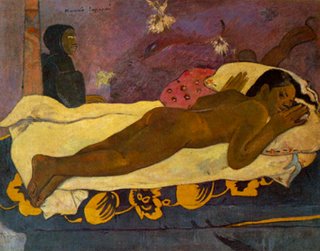
Paul Gauguin - The Spirit of the Dead Watching (1892)
"The Savage is decidedly better than us...I am a savage. And the civilised forsee it, for there is nothing surprising or confusing in my work except this savage-in-spite-of-myself. For that reason it is inimitable. The work of a man is the explanation of that man."
Paul Gauguin (from a letter to Charles Morice, 1903)
"If one views (as I do) Gauguin's Tahitian painting with sympathy - as marking a decisive break from current European representation of the nude - one may [say that] Gauguin produced new and compelling art even while his discourse remained hostage to primitivist myths because he turned this discourse to other uses, made his objects of representation call into question traditional kinds of looking. His construction of "the natural"...is a matter of the utmost artifice, aimed at disarming our traditional view of the nude and of the primitive, revising the space of our observation and the context of our looking. Gauguin's "exotic" continually refers us back - and is meant to refer us back - to the problem of the nude in Western art."
From Gauguin's Tahitian Body by Peter Brooks
"There is, in short, a darker side to primitivist desire, one implicated in fantasies of imaginary knowledge, power and rape; and these fantasies, moreover, are sometimes underpinned by real power, by real rape. When Gauguin writes in the margins of the Noa Noa manuscript, "I saw plenty of calm-eyed women. I wanted them to be willing to be taken without a word, brutally. In a way [it was a] longing to rape", we are on the border between the acceptable myth of the primitivist artist as sexual outlaw, and the relations of violence and domination that provide its historic and psychic armature."
From Going Native by Abigail Solomon-Godeau
From Gauguin's Tahitian Body by Peter Brooks
"There is, in short, a darker side to primitivist desire, one implicated in fantasies of imaginary knowledge, power and rape; and these fantasies, moreover, are sometimes underpinned by real power, by real rape. When Gauguin writes in the margins of the Noa Noa manuscript, "I saw plenty of calm-eyed women. I wanted them to be willing to be taken without a word, brutally. In a way [it was a] longing to rape", we are on the border between the acceptable myth of the primitivist artist as sexual outlaw, and the relations of violence and domination that provide its historic and psychic armature."
From Going Native by Abigail Solomon-Godeau